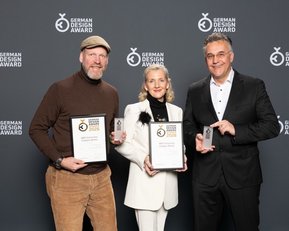The Institute for New Work and Coaching (INWOC) on the Berlin campus of SRH University has published the results of the New Work Barometer 2025.
New Work Barometer 2025: Is authoritarian leadership making a comeback?

In a world characterised by technological progress and changing social expectations, the traditional workplace is also being redefined. In this context, working from home, agile working methods and a stronger focus on work-life balance are just some of the aspects being discussed under the buzzword "New Work".
Every year, the New Work Barometer provides in-depth insights into these developments and analyses current trends and their impact on the world of work. "Despite decreasing media presence, the barometer continues to show an increase in the importance of New Work in organisations in German-speaking countries," says Prof. Dr habil. Carsten Schermuly, Managing Director of the Institute for New Work and Coaching (INWOC) at SRH University Campus Berlin.
In addition to recurring questions about associations, practices and developments in New Work, the barometer focuses on one or two key topics each year: the use of artificial intelligence in the context of work in 2025 and the role of power in organisations.
Psychological empowerment as the key
One of the objectives of New Work measures in organisations is psychological empowerment, which describes the experience of meaningfulness, self-determination, influence and competence in the workplace. The results of the New Work Barometer 2025 show: Organisations where New Work practices are used at all (76% of the total sample) promote self-determination the most with the help of New Work (81.6%), while the potentials of promoting competence (51%), a sense of purpose (44.6%) and promoting influence (33.1%) are not fully exploited.
Real empowerment only arises when all four dimensions work together, as Prof. Dr habil. Carsten Schermuly explains: "Our results show that despite the introduction of New Work practices, it appears that only parts of empowerment are being sought and that the influence associated with power in particular could continue to be distributed among a small number of managers. At the same time, organisations that target all four dimensions of empowerment achieve better organisational success on average."
Leadership styles and power distribution
In view of the major influence of the tech giants in Silicon Valley, global political developments and the recurring reports of top management announcing measures to bring employees back to the office, the New Work Barometer 2025 also posed the question: Is authoritarian leadership making a comeback?
Three different leadership styles were analysed: in addition to authoritarian leadership, democratic leadership and the "laissez-faire leadership style", in which the leader largely holds back. The democratic leadership style was most strongly represented in the Barometer sample, while the respondents perceived authoritarian leadership in their organisations to a slightly lesser extent. Laissez-faire leadership was mentioned least frequently.
"Contrary to our assumptions, there is no widespread trend towards authoritarian power. Nevertheless, there are some sectors in which authoritarian leadership dominates, for example in industry, the transport sector and public administration," summarises Prof. Dr habil. Carsten Schermuly summarises.
Artificial intelligence in organisations
The second focus of the New Work Barometer 2025 was the use of artificial intelligence in organisations. 19 per cent of the organisations surveyed stated that they had not yet used AI in any area, while 16 per cent stated that AI had been introduced in all areas of their company. In all other organisations, AI was used in individual areas, with IT, the marketing department, research and development, HR and public relations being the most frequently mentioned.
The main reason given for introducing AI was to increase productivity (64%), followed by reducing the workload of employees (52%) and data analysis and forecasting (45%). Promoting innovation and reducing costs are also an issue.
Prof. Dr habil. Carsten Schermuly emphasises: "Artificial intelligence has arrived in companies, albeit not across the board. Many see it as a support, but there are also fears. It is therefore crucial to organise AI as a learning process through preparation and open communication in order to promote productivity without destroying trust."
Background to the New Work Barometer
The New Work Barometer is conducted by the Institute for New Work and Coaching (INWOC) at SRH University Campus Berlin in collaboration with Personalmagazin (Haufe) as media partner and HRpepper GmbH & Co KGaA as practice partner.
To collect the data, 569 representatives from various organisations were surveyed online between March and May 2025. At 87 per cent, the vast majority were from Germany. The participants were presented with different understandings of New Work as well as a selection of specific New Work practices for assessment.








